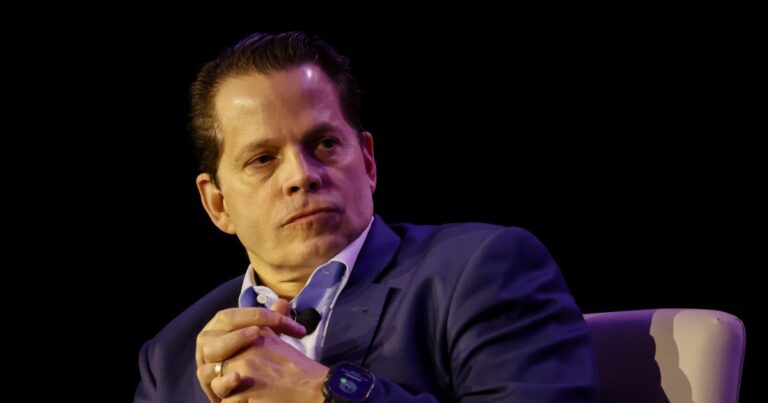Anthony Scaramucci is struggling to spin one of President Donald Trump’s big tax breaks into a profit for his wealthy clients. Yet “the Mooch,” as he’s known on Wall Street, keeps getting paid his fees.
The hedge fund manager known for his 10-day stint as White House communications director in 2017 promised wealthy investors that he could help them take advantage of Trump’s signature program for spurring projects in low-income communities, dubbed opportunity zones.
His list of ideas included a luxury hotel in Oakland, California, a warehouse in Savannah, Georgia, and middle-income housing.
But key targets that Scaramucci laid out in 2018 interviews haven’t been realized. Instead of raising $3 billion for his SkyBridge Opportunity Zone Real Estate Investment Trust, he amassed less than $50 million and made a single investment: a Virgin Hotels property in the Warehouse District of New Orleans.
The vehicle has yet to distribute payouts to REIT shareholders — let alone generate the 8% to 10% annualized returns before tax benefits that he suggested would be possible over the fund’s lifetime.
SkyBridge Capital, meanwhile, continues getting paid 1.75% of the fund’s net asset value, which was $43.2 million at the end of 2024.
Executives for the hedge fund firm declined to comment.
Trump’s One Big Beautiful Bill Act recently made opportunity zones permanent, setting up another wave of investment funds that could start taking shape in January 2027. The SkyBridge experience may serve as a cautionary tale to investors: Tax benefits only matter if you make money.
Trump championed these zones in his first term as a way to drive private capital to long-neglected parts of the U.S. Investments in the zones topped more than $80 billion, according to a report from the Joint Committee on Taxation based on returns filed for 2019 through 2022.
Boosters say the zone investments have helped build affordable housing and created jobs and new businesses.
Yet these dollars have not been evenly spread, with much of the money flowing to urban and suburban areas and wealthier states such as Florida and New York, the Joint Committee found. Louisiana, home to the SkyBridge fund’s hotel, received less than $500 million, or $106 per person, one of the lowest amounts across the U.S., even though it’s among the poorest states.
Most academic studies of the program show that, at least in its first few years, the opportunity zones had little or no economic impact, according to the Joint Committee’s report.
Investors, though, potentially win big. If they take profits from stocks, bonds or other investments and put them into an opportunity zone fund, they’ll reduce their capital gains on the initial sale and defer its payment until 2026. If they keep the fund for at least a decade, they’ll pay no capital gains on its returns.
So far, it looks like SkyBridge clients could miss out on that tax-free benefit. From the firm’s initial money raise in December 2018 through the end of last year, it has lost 1.4%, according to investors. Those who got into the fund the following year are down 5.6%, the investors said.
The New Orleans hotel is a sleek building with a rooftop pool, nestled in a neighborhood full of galleries, restaurants and shops. It gets 4.7 stars out of 5 on TripAdvisor. Even so, some investors say they doubt the value of the hotel will rise sharply in coming years. It makes money, but its net operating income has been fairly stable — between $4.7 million and $5 million — in its first three full years of operation, according to investors.
The lack of growth is in line with other hotels in New Orleans, where revenue per available room was 11% lower in July than it was three years earlier, according to data from STR.
While data on opportunity zone investment returns more broadly is scant, the pandemic hit the real estate market hard, meaning that some funds have had difficulty making money. A pool that backed downtown office buildings, for example, is probably underwater, while one that focused on multi-family units in the Sun Belt would more likely be profitable.
“The program has been disappointing,” SkyBridge President Brett Messing said in a March 2020 interview with Yahoo Finance, pointing to the 10-year holding period and inherent risks of real estate development. “We’ve been modestly successful, but it’s been tougher to execute than we expected.”
No-win situation
Because of strict loan covenants, the hotel’s lender sweeps some profits into an escrow account, meaning investors in the REIT haven’t received any cash distributions. The REIT itself has run out of money, so in July it sold new shares to existing holders. With the proceeds, it can continue to pay fees to SkyBridge.
The fund offered more than $6 million of shares to existing holders at an 80% discount, amounting to 15% of shareholder equity, according to investors and a regulatory filing.
That move put clients in what some saw as a no-win situation. If they chose not to participate, they’d dilute their holdings. If they chose to buy, they’d get an immediate return on paper — but could risk having to pay taxes on that gain unless the fund owns the hotel for 10 more years. SkyBridge told some investors it expects to get out before then.
SkyBridge also charges investors a collective $150,000 a year for proxy fees and an annual meeting on video conference.
During last year’s shareholder call, Messing told clients he couldn’t answer their questions about the fund because he was sitting in his car in Los Angeles. Anyone wanting more information could set up a call in the coming weeks, he said.
When investors groused about the lack of immediate responsiveness, he said he was adjourning the meeting, which caused even more complaints. Messing retorted with a threat: Keep up the insults, and we won’t talk to you at all.
On this year’s call held in May, SkyBridge put its clients on mute.


